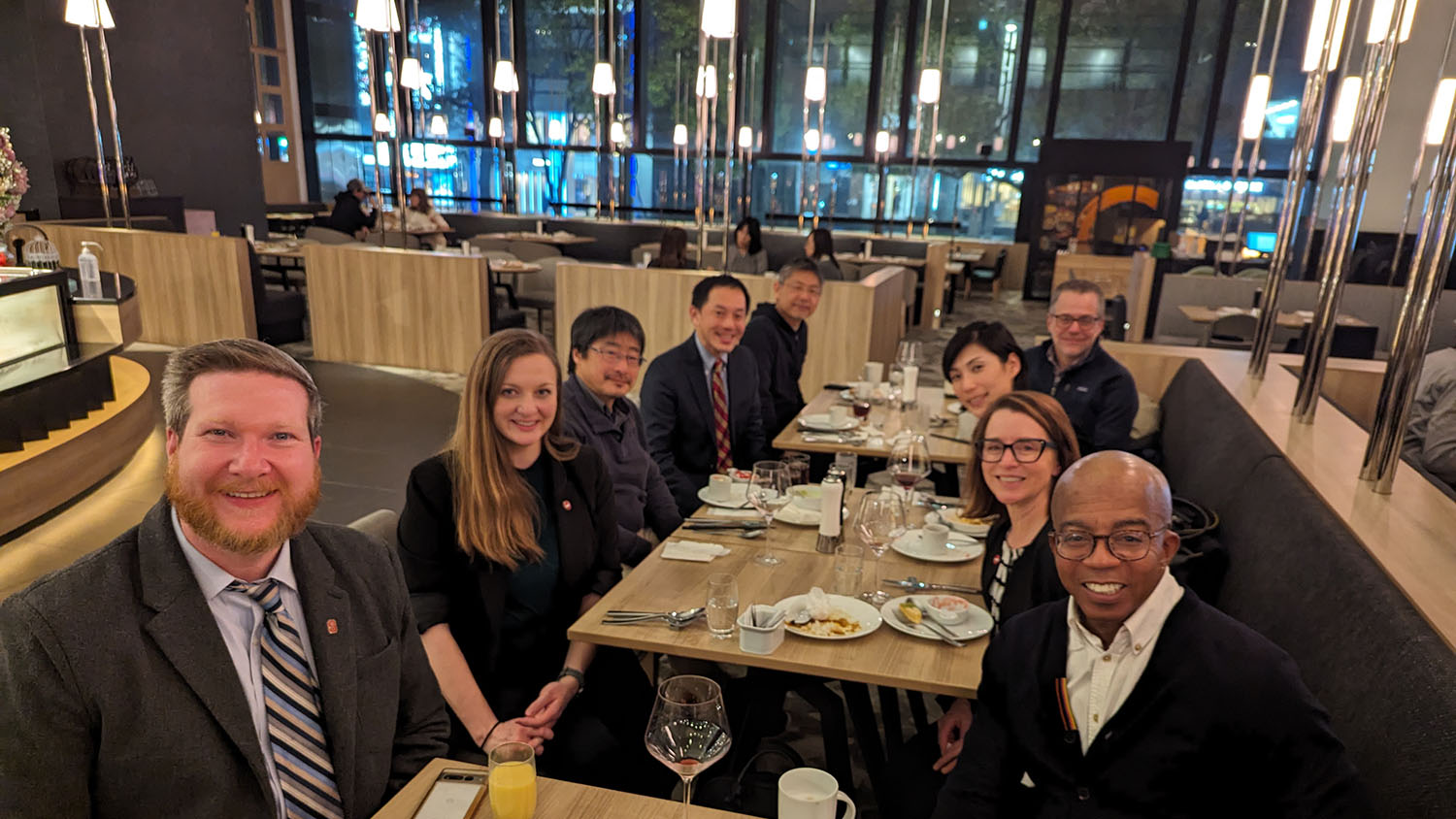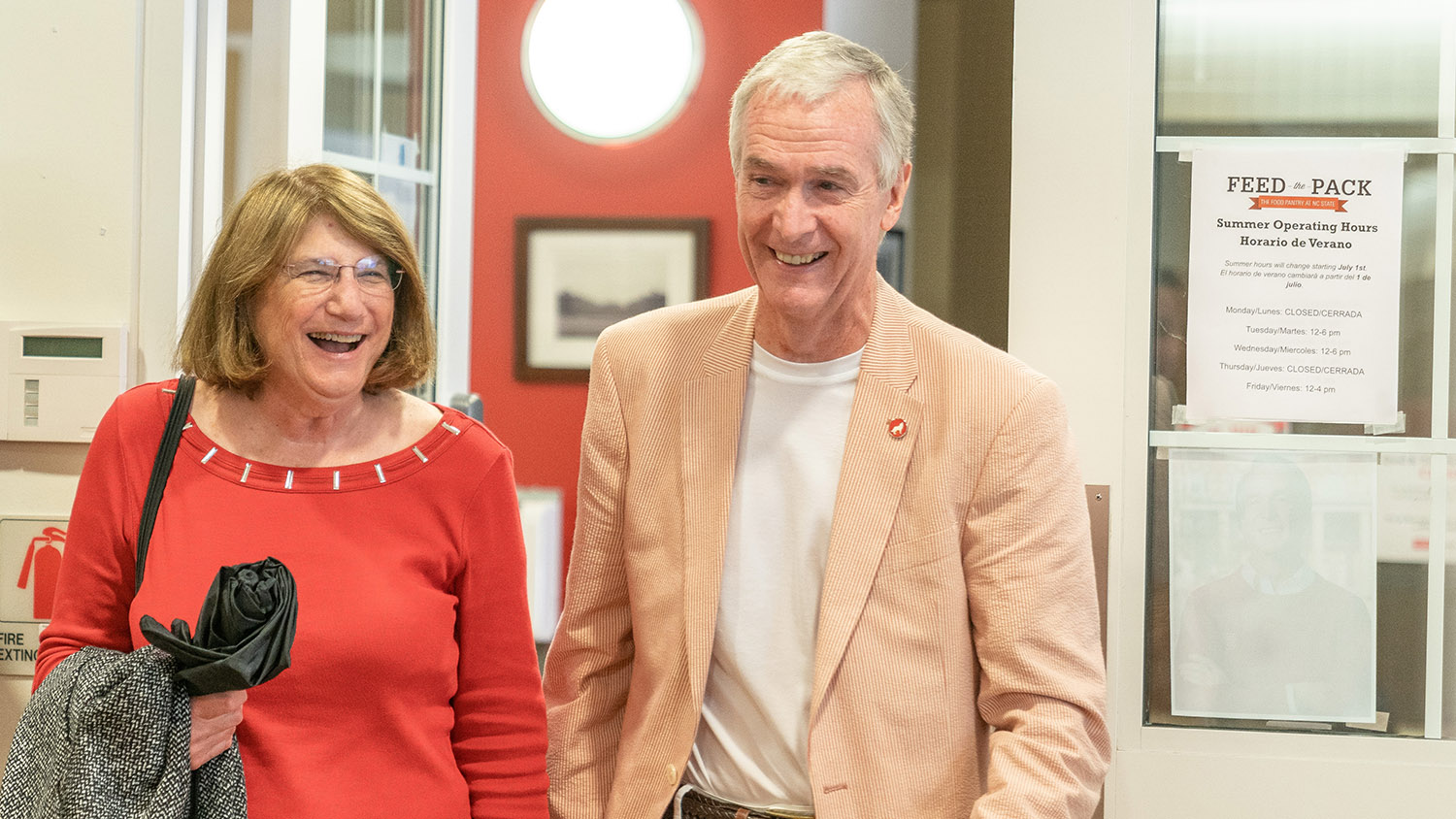Seeing the Message
 |
| Dean Braden welcomed President Obama to NC State. |
Most people who were lucky enough to snag a ticket for President Obama’s recent speech at Reynolds Coliseum heard NC State’s marching band play a brassy fanfare in honor of the Commander in Chief. They heard the tiny clicks and whirs of thousands of digital cameras attempting to capture fleeting moments. And when the President walked on stage and began to speak to the crowd of thousands, they listened carefully to his every word.
 |
| Braden signed for the president. |
However,those in the audience who were deaf or hard of hearing had to rely on the skills of an American Sign Language (ASL) interpreter to deliver the president’s speech through signing. As President Obama stood behind the podium and spoke to the audience about the American Jobs Act, a man in black stood behind him relaying his message to those who could not hear it for themselves. If you looked closely enough, you probably recognized that man as CHASS Dean Jeff Braden.
Typically, licensed ASL interpreters are sought out to serve at large public events. However, some situations, such as an unexpected visit from the president of the United States, are exceptional. Although university officials contacted licensed ASL interpreters to serve during the president’s speech, they couldn’t get the information they needed to provide two interpreters in time to meet the White House’s stringent security clearance standards. To ensure that every attendee was given the opportunity to hear the president’s message in one way or another, the university turned to Braden, who gladly accepted the assignment. He was joined by ASL interpreter Grace Bullen Sved.
As a former certified ASL interpreter, Braden has along history with the language. During his senior year of high school, his mother, who was a social worker, placed a deaf child with special needs in a neighbor’s home. She asked Braden if he could help the family with child care after school. Braden agreed and soon began visiting the child regularly. He grew exceptionally fond of signing during this first exposure, and decided to continue sign language studies at college.
As an undergraduate at Beloit College, Braden was required to complete a “field term” during which he could explore his own personal academic interests or get involved in public service efforts. He opted to get hands-on experience in sign language, and spent a year working in the deaf-blind unit at the Perkins School for the Blind.
While there, Braden met an intern from Gallaudet University,the world’s only university specifically designed to meet the needs of the deaf and hearing impaired. The intern, who was born deaf and going blind, was also from Braden’s home state of Wisconsin. During one of their many conversations, the man suggested that Braden spend some time at Gallaudet. There, his friend suggested, Braden would be fully immersed in a deaf community and could hone his signing skills.
Braden spent his junior year immersed within the deaf community at Gallaudet, and left fluent in sign language. He was so confident in his abilities that as a senior, he talked his way into a job at Beloit teaching ASL to his peers. “When I got back to Beloit, I walked straight to the foreign languages department and said ‘Hey, if you need an ASL instructor, here I am.’ And that was that,” Braden says.
Braden’s skills in sign language have given him access to a number of opportunities, including collaborative work with renowned psychologists and chimpanzee researchers Trixie and Allen Gardner. “I was doing student teaching in preparation for being an elementary school teacher,” Braden says. “One day in class, a voice comes over the intercom and says, ‘Excuse me, Mr.Braden, you’ve got a long distance phone call. Could you come to the office and answer it?’ And back then, long distance phone calls were a big deal.
“I go to the office, pick up the phone, and hear, ‘Hello, this is Allen Gardner. I’m wondering if you might be interested in working with me to teach sign language to chimpanzees at the University of Nevada, Reno.’ I’m thinking it’s one of my friends pulling a prank on me or something, so I say, ‘No, really, who is this?’ But it was him, and I ended up teaching sign language to chimps for a year.”
Braden’s gig with President Obama was not his first experience with interpreting for celebrities. He interpreted at the May 1979 NoNukes Rally in Washington, DC, for acts including John Sebastian, Jackson Browne, and Joni Mitchell. The rally attracted 65,000 people who were protesting for nuclear safety standards in the aftermath of the Three Mile Island incident.
Although the number of people for whom Braden has interpreted reaches into the tens of thousands—a figure that might intimidate the best of public speakers—Braden remains unfazed.
“When you first walk up there and you look out and see thousands of people, it’s definitely nerve-wracking,” he admits. “But then sign language requires the use of so many different faculties, you just get focused and forget about the crowd.”
When reflecting on all the experiences he has had through sign language, Braden stresses the importance of broadened perspectives. “It certainly expands your sense of diversity. Deafness is another culture, sign language is another language. And at Gallaudet, I had the experience of being a minority, which definitely will change your outlook on life. It gave me a deep appreciation for what it means to be human. I am so lucky to have had the opportunities I’ve had.”
Jen Jernigan, CHASS communication intern
- Categories:


